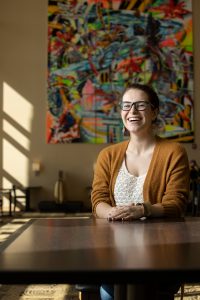Students helping students
By Theo Schwinke

When the call went out for volunteers for the Care Team, Molly Frank didn’t hesitate.
“It needed to be done,” she said.
Frank already wore a lot of hats. A graduate student at Mizzou, she is also a member of the executive board of the Graduate Professional Council and a full-time staff member in the Division of Student Affairs.
The Office of Student Accountability & Support has long had a team in place to provide personalized assistance to students who need help with issues ranging from health to housing to food insecurity.
With the onset of the coronavirus pandemic and students started entering quarantine or isolation, the need for support increased significantly, which meant the Care Team needed to grow. A lot.
For Frank, the Care Team duties quickly expanded to become a full-time job in itself — and then some. As positive cases peaked in mid-September, Frank estimates she put in a week and a half of around-the-clock work.
Frank was far from alone. At the peak of the pandemic, the Care Team had more than 60 volunteers from various areas of campus.
Brittany Pomilee is a graduate assistant in the Office of Student Engagement (OSE), where she coordinates and advises student service programs. The Office of Student Engagement encourages students to become active citizens, Pomilee said; for her, volunteering on the Care Team was an easy decision. “I found it necessary to practice what I advise my students to do,” she said.
“Since I enjoy serving my community, I want to make sure my fellow Tigers are being taken care of during these crazy and unfortunate times,” Pomilee said.
Pomilee estimates she spends six or seven hours a day answering questions, providing resources and talking to students in quarantine or self-isolation. She said the work can be stressful but added, “I love getting to serve our students and reminding them that someone is here for them.”
Mel Frieders is another graduate student in OSE. She served as a volunteer for Residential Life, helping that department reach out to students isolating in temporary housing. For two to three weeks, she called 10 students a day to check on their needs.
“I was scared. I’d heard a lot of negative things on social media and a lot of not-so-great feedback, but all the students were really nice,” Frieders said. “Residential Life did a good job of communicating with them and anticipating their needs.”
Putting together and coordinating such a large team in a short period of time was largely the work of Assistant Dean of Students Lori Fox, Wellness Resource Center Director Christy Hutton, and Office of Student Accountability & Support Director Julie Drury.
“They did a lot of work with coordinating volunteers, adjusting, tracking systems for figuring out how to track the students we call, how do we make notes,” Frank said. “They were also liaising with other areas of campus, with IT, talking with Health Department … They developed a team to assist with case investigation, not just outreach and support.”
“It was a lot of outreach. It was thousands of phone calls and constant troubleshooting,” Frank said.
But the work was gratifying. “I had a lot of students who were like, ‘I didn’t want to be forgotten about.’ So that’s what we were doing,” Frank said. “Every time someone said, ‘Thank you, I’m glad you called,’ it was nice.”